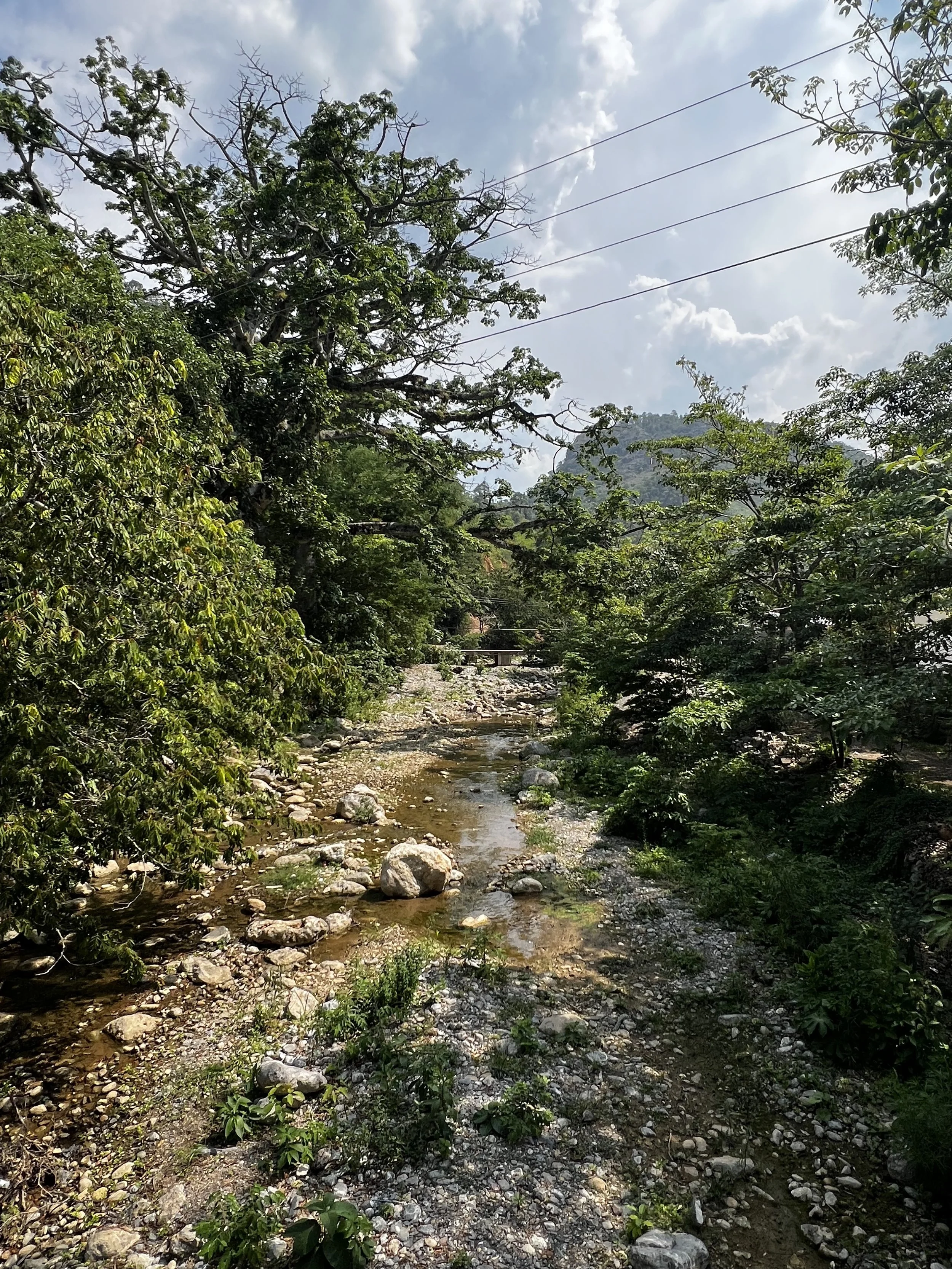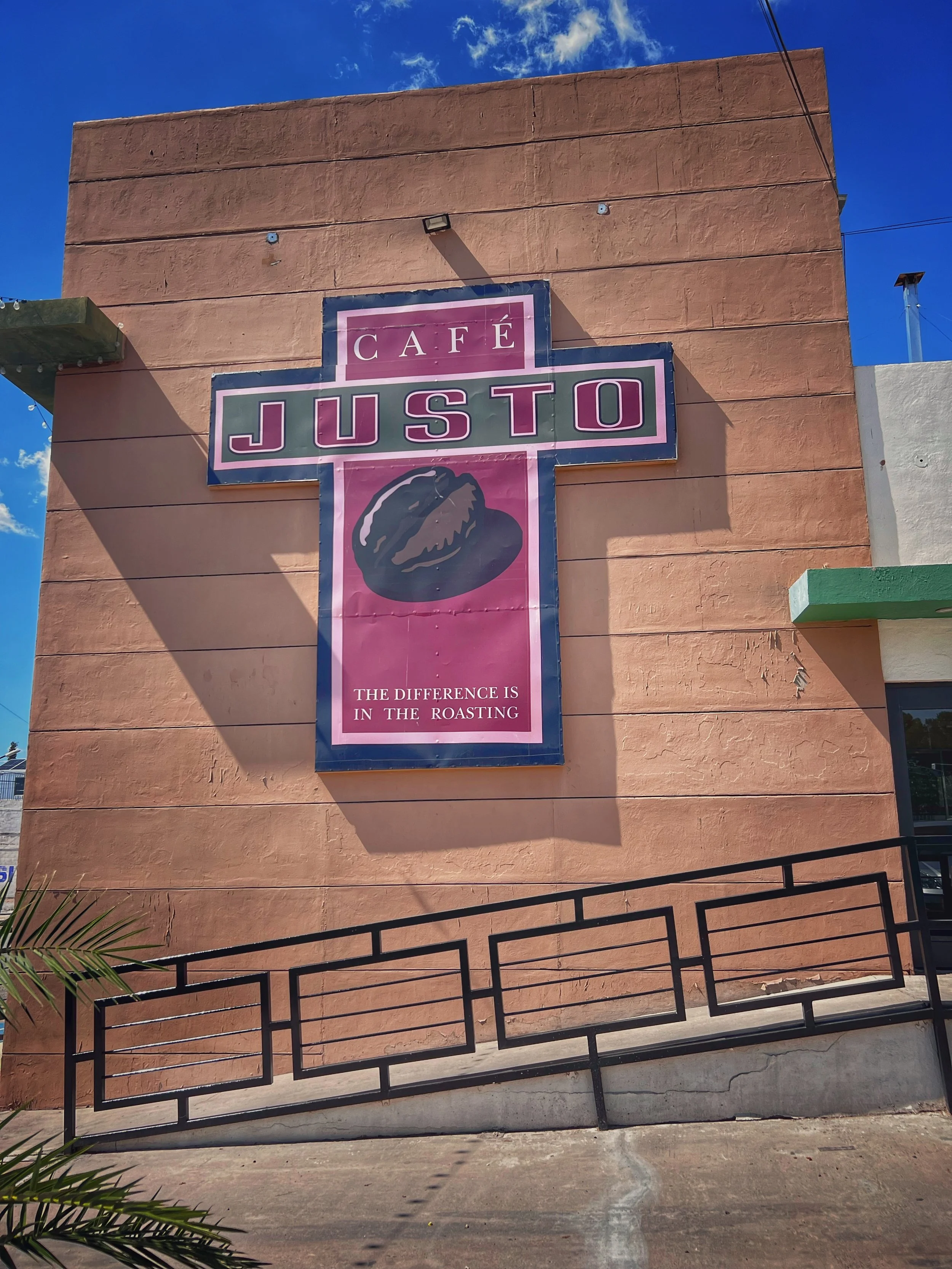Climate Justice and the Power of Belonging
Shalaguá, Chiquimula, Guatemala
“We just want a chance to stay in our country.”
That was the first thing they told me, seated on the banks of a stream that had slowed to a trickle. We were in Shalaguá, a village just twelve miles from the Honduras border. Shalaguá means “a lot of water” — a fitting name for a place fed by many streams. But names can become memories.
Shalaguá, near the Guatemala-Honduras border, courtesy of Google maps
“There should be water here by now,” one of them said, pointing to the parched earth behind us. “But you see… there isn’t.”
Dry stream in Shalaguá, Guatemala. Photo by Amali Tower
I did see. Where a steady stream should have been, there was now little more than a thin ribbon of water and scattered stones. That water also flows into the Jupilingo River, the main artery for this region. But the rains had been late for weeks — a sign of shifting rainfall patterns, another reminder of the unpredictability climate change brings.
The group sitting with me was small, Indigenous Maya who were a cross-section of the community: two farmers, two self-employed business owners, one aspiring lawyer. They carried themselves with the weariness of people who work harder each year to secure less.
“I have three jobs,” one man explained. “My father was a farmer, and his father before him.”
I asked if he still farmed. He smiled faintly and shrugged. “Sí… but it’s not like my father’s time now.” He gestured toward the hills. The rivers ran lower than in years past, he said, and deforestation had stripped the land of its natural resilience.
“There’s no water because we can’t rely on the rain,” another added. “And then there’s too much,” someone else said as they all nodded in unison.
I had asked if climate change was a factor, and just as my words were being translated, their heads had nodded up and down in unison with a declarative “Sí!”
I knew from my earlier consultations with ASORECH, a local NGO, that their words echoed a wider truth. Water, especially for cultivation, was the greatest need in this region. Without it, farming becomes a gamble few can win.
Maria*, a widow, sat quietly in the middle of the circle. When she spoke, her voice was steady but tired. Her husband, a farmer, had passed away, leaving her with grief and no income. She had thought about leaving for the United States — but visas are impossible to obtain, and the thought of abandoning her home weighed heavier than hunger. “I don’t want to leave my home,” she told me.
Maria’s* restaurant in Shalaguá by Amali Tower
With ASORECH’s help, Maria started a small café. That day, she invited our small group for lunch: an open-air kitchen shaded by a massive tree, a few plastic tables scattered beneath it, a hammock stretched lazily nearby. The food was simple, nourishing, and offered with pride. When I told her how much I enjoyed the meal, her whole face lit up.
Lunch in Shalaguá. Photo by Amali Tower
ASORECH’s irrigation project had also begun to change lives here. One farmer, weary but determined, told me about the beans and maize he could now grow. Then, breaking into a smile, he added: “I have even established aquaculture for the first time.”
Felx*, another villager, listed his jobs — barber, mechanic, butcher. “We all have several jobs,” the other farmers nodded. “We have to… to survive.”
In Shalaguá, everyone is a farmer. The land binds them, even as it betrays them. Whether they can still farm in the future — that remains the question that shadows every conversation, every meal, every hope for staying.
Agua Prieta, Mexico
The first time I sat at Café Justo in the border town of Agua Prieta in Mexico, I was struck by how ordinary it felt. The clinking of cups, the aroma of freshly roasted coffee, laughter bubbling up from the next table. But beneath the hum of a café, something extraordinary was happening.
The farmers who built this cooperative had not only grown coffee—they had grown a future. One man leaned forward as he told me, “I didn’t want my children to be what I am. I wanted them to be professionals. Not in the United States. Here. In our own country.”
Café Justo in Agua Prieta, Mexico. Photo by Amali Tower
I remember looking around the table, catching the nods of others, the quiet weight of agreement. It wasn’t anger in his voice. It was longing. A simple dream: that the next generation could thrive without leaving everything behind.
And I thought—my God, isn’t that what we all want? Whether or not we have children of our own, we hope that those who come after us will live with dignity, security, and possibility. For me, that hope is the reason I do this work.
My thoughts went back to months earlier, when I had been on the border of Guatemala and Honduras, and had met that small group of men and women gathered under the shade of a tree. The air was thick with heat, the sound of motorbikes and roosters competing in the background. One young woman, a student of international law, spoke softly but firmly: “We just want a chance to stay.”
Her words had hung in the air. Everyone had nodded—farmers, entrepreneurs, parents working two or three jobs. Despite their different paths, they all said the same thing: we want to stay.
That refrain has followed me across borders, across years of work.
And yet, U.S. policy often answers with the opposite. Trade deals like the former NAFTA and CAFTA promised prosperity but left small farmers devastated and displaced, their markets undercut by cheap imports. Climate change compounds those losses—years of drought leave fields barren, while floods sweep away entire harvests. Multiple droughts since 2014 have left farmers with consecutive years of crop losses of at least 70 percent, while periods of intensive rainfall have also damaged crops. When families cannot feed themselves, migration is no longer a choice; it’s survival.
But what I witnessed at Café Justo tells another story. Twenty years ago, a group of farmers secured a $20,000 loan to launch their cooperative. It was not a grand international plan—it was a simple act of faith: that by working together, they could build a life strong enough to keep families rooted.
That cooperative recently celebrated its 20th anniversary. And when I took that first sip of their coffee, rich and strong, I thought about the artistry behind it—the hands that planted, harvested, roasted, and shipped it, all with the same goal: a dignified future at home.
That, to me, is what climate adaptation should look like. It’s not just seawalls and solar panels. It’s communities creating the conditions to stay. It’s small cooperatives, youth projects, local entrepreneurship—investments that don’t just protect against storms but nurture belonging.
Yet we see billions spent instead on border walls, surveillance towers, and detention centers. Militarized solutions that paint migration as a threat rather than what it so often is: an act of sacrifice and care.
Over twenty-five years of talking with people on the move, I’ve never once met someone leaving joyfully. Every story I’ve heard is threaded with sacrifice—parents crossing for their children, sons and daughters crossing for their families. The narrative that migrants are dangerous or opportunistic collapses when you sit and listen. What emerges instead is love, responsibility, and unimaginable courage.
And it leaves me wondering: what if our policies honored that sacrifice? What if climate adaptation funding centered the right to stay—investing in the same kinds of small, creative, community-rooted solutions I’ve seen in Guatemala, Honduras, and Mexico?
Because when a farmer tells you, “I wanted my children to be professionals here, in our own country,” there is no complexity to unravel, no need for jargon or geopolitical analysis. It is a human truth; one every person can understand.
We all want a chance to stay.
And climate justice, at its core, must begin there.
This article is part of a larger storytelling work based on 2024 fieldwork conducted in Guatemala and the borderlands of Guatemala-Honduras and USA-Mexico that will be published in the lead-up to COP 30 in Brazil this November.
*Names used are pseudonyms






